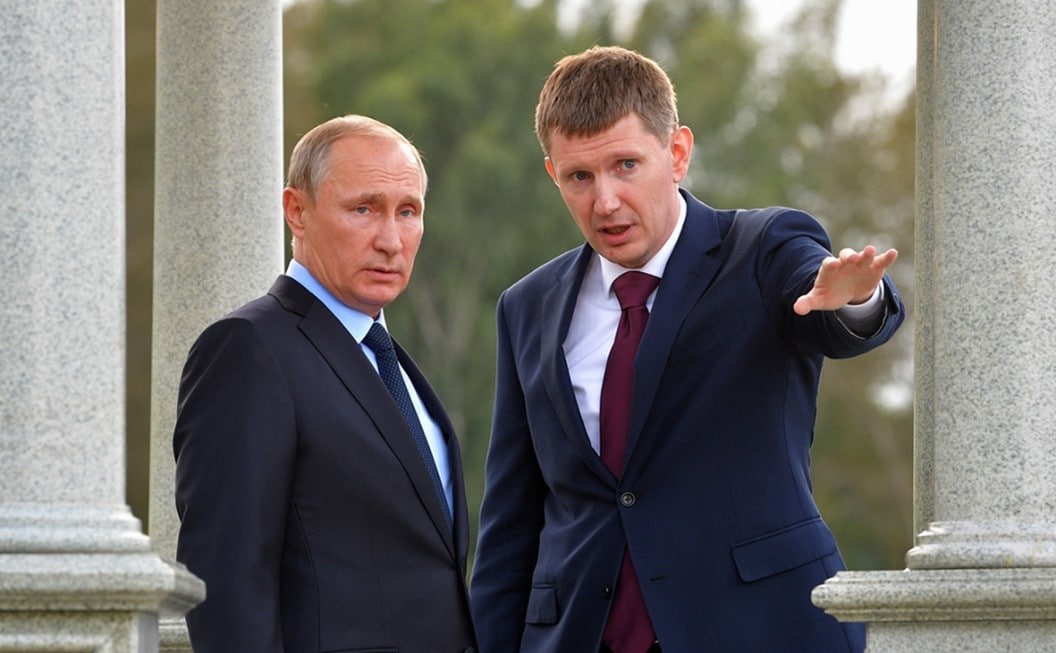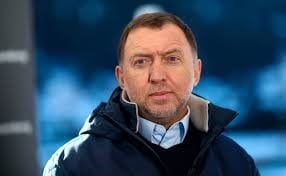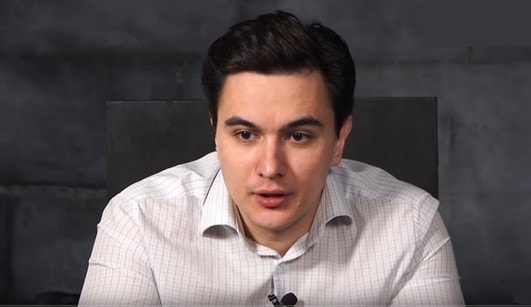At a closed meeting of the Russian government on December 9, 2020, Russian President Vladimir Putin criticized the Minister of Economic Development Maxim Reshetnikov and the Minister of Agriculture Dmitry Patrushev for the price rises in basic food products. Putin demanded immediate action to stop the price rises:
"Decide within a week! Finalize all the agreements during tomorrow or the day after tomorrow and issue the appropriate management decisions." Part of the meeting, featuring Putin's dismay at the price rises was subsequently broadcast on national television. Referring to the rise in sugar prices, Putin snapped: "People are limiting themselves because they have no money for basic food. Where, where are you looking? This is the question! This is not a joke! In conditions when unemployment is growing, and incomes are decreasing, basic products are becoming more expensive...and you tell me stories here."[1]
The bureaucracy swung into action. A three-month price freeze was imposed on sugar and sunflower whose prices had skyrocketed recently. [2] Likewise export controls were imposed on wheat, rye, barley and corn to stabilize prices for bread and flour.[3]

Putin with Reshetnikov (Source: Rbc.ru)
Some were less impressed by Putin's scapegoating of Reshetnikov and Patrushev.
Billionaire Oleg Deripaska, on his Telegram channel, claimed that the rise in food prices were the result of the underfunding of the agricultural sector and the failure to invest in infrastructure that would improve its efficiency. He wrote: "I found it strange that everyone was surprised by the rise in food prices. We need to look at what has happened in the last 10-15 years: at what percentage was the agricultural sector able to finance its projects. I think, on average, it will come out to be no less than 12% per annum. Well, what profit should it [agriculture] receive in order to pay this interest?
"Obviously, serious changes took place in the agricultural sector, there were normal ministers and people who were in charge of the agrarian question... But, nevertheless, neither they, nor entrepreneurs, nor farmers will be able to perform a miracle, as long as we provide agriculture with money at usurious interest rates...
"We should be surprised that there is generally enough food. Here we need to change our approach: if we provide the agricultural sector with money at least at the same percentage as in Europe or America, there will be no price increase...
"Serious investments are required: in infrastructure, in logistics, storage, in order to cut losses, in order to increase the efficiency of processing. And then the supply will significantly exceed the demand, especially in the 'prosperous' regions, and there will be no problems with prices."[4]

Oleg Deripaska (Source: Rbc.ru)
If Deripaska concentrated on the ills of the agricultural sector, economist Vladislav Zhukovsky, a member of the Stolypin Club Presidium (a group originally formed by the Kremlin and comprised of economists, businessmen and experts), believes that government policies across the board have contributed to inflationary pressures and cites the recent ban on agricultural imports from Azerbaijan, Armenia and Uzbekistan.[5] In an interview with Rosbalt's Anna Semenets Zhukovsky explains why Putin's shocked reactions are laughable and Russia is in for a depressing stagflation.
The interview with Zhukovsky follows below:[6]
— How will the restrictions on the import of goods to Russia affect prices?
— Russia introduced the ban on the import of apples and tomatoes from Azerbaijan, and tomatoes and peppers from Armenia. We understand very well that Rosselkhoznadzor [Federal Service for Veterinary and Phytosanitary Surveillance] is in many ways a foreign policy office, an instrument of Russia's foreign policy. We all remember the high-profile scandals with Moldova, Belarus, Armenia, Georgia – [they involved claims of] some moths, larvae, pests and other nasty things. which suddenly turned up just when relations between the leadership of Russia and neighboring states deteriorated.
SUPPORT OUR WORK

I believe that this measure has a political connotation. And the fact that products from Armenia and Azerbaijan fell under the ban is very indicative against the background of the conflict in Karabakh, which is in a frozen state.
When food supply from neighboring countries stops, the consequences largely depend on the scale of such import. Do you remember how this spring in the Far East, in Khabarovsk and in Primorye, in the Amur and Irkutsk oblasts prices for food, including cucumbers and tomatoes, jumped not by tens of percent, but by hundreds of percent when Russia suddenly decided to introduce restrictions on the movement of not only people between Russia and China, but also on cargo. In the context of the critical dependence on imports of the food market of the territories beyond the Urals, these restrictions caused tomato prices to suddenly increase to 600-1000 rubles [per kilogram]. There were even price tags at 1200 rubles per kilogram...
I believe that restrictions on imports from Azerbaijan (to a greater extent) and from Armenia (to a lesser extent) will cause a sharp increase in prices. The Increase in retail prices, not exponentially, but by 15-25% will happen - simply because it will be necessary to change suppliers and logistics. To top that: any talks about scarcity automatically generates a rise in prices.
— Can Russia replace import of Azerbaijani tomatoes?
...The ban on the supply of tomatoes from Azerbaijan may lead to change of a store tag on these tomatoes from Azerbaijani to Belarusian. In other words, gray imports will be in operation.
The import will go through transit territories, where the goods will be repackaged and then delivered to Russia under the guise of not Azerbaijani [goods], but goods from other countries. The growth of costs, corruption, and cash kickbacks will cause price increases. And all this is the product of a deterioration in political relationships, and not about citizen health concerns at all.
— Well, this decision looks rather strange against the background of a record drop in household income.
— Our entire economic policy is built around the principle "to spite grandmother, let's freeze our ears off" or "to spite the State Department let's blow up Voronezh". The main beneficiaries of economic policy are big business, raw material exporters, and financial speculators. The authorities do not really care about the problems of the population.
Official Rosstat data show the inflation indicator standing at 4%. Romir Holding [Ltd., a Russian social research company], after analyzing the checks of Russians, states that in annual terms prices increased by 14%, and for imported food only in October, in comparison to the same month of the previous year - by 23%. That is: real inflation is three to four times higher than the official one, and for imported goods - five times.
But even official figures show that since the beginning of the year beef prices have risen by 4.5%, canned meat - by 8%, sunflower oil - by 25%, margarine - by 6.6%.
It is very funny to watch how Russian President Vladimir Putin and Prime Minister Mikhail Mishustin suddenly learned on TV camera what is happening in Russia, that food prices are rising in Russia. They were horrified, angry, and said: "we will not allow, we will not forgive."
They pretend they don't really understand why prices are increasing. It is banal, but the fall of the national currency exchange rate against the dollar from 62 to 80 rubles (almost 27%) automatically inflated prices for all imported components, machinery, equipment, seeds, feed, chemicals.
Gasoline prices are rising, VAT is increasing, taxes are being introduced on the self-employed. Why should prices suddenly go down if you yourself did everything to make them grow? And the Rosselkhoznadzor actions will also result in further price rises...
— They say that in such conditions, prices could rise even faster, and they aren't rising solely because effective demand is decreasing. Is this true?
— The only thing keeping prices down is the fall in the population's real incomes, and the reduction in food consumption. According to official data from Rosstat, since 2014, incomes have fallen by 8%, and by the end of this year they will fall by yet another 5%. If we consider that the real inflation rate is not 4%, but 14%, then, in reality, only this year the population's standard of living will decline by 15-20%.
In Russia, the consumption of milk, vegetables, fruits, meat, fish and seafoods is decreasing. People either buy all this, but in smaller quantities, or switch to other products with a higher caloric content: cereals, bread, potatoes, pasta.
I cannot recall a single decision taken by the Russian authorities over the past few years, that was truly aimed at raising the population's standard of living, at fighting poverty or reducing the gap between rich and poor, and which would really stimulate income growth and decrease in goods' prices.
All decisions - from the introduction of the Platon [truck toll] system to the increase in the VAT rate from 18 to 20% - automatically provoked a price jump for all goods everywhere. Control of trucks movement on highways, the introduction of goods labeling, an increase in tariffs for utilities and electricity - all these production costs were passed on the price of the goods. The state with its own hands makes it so that the prices decreasingly reflect the real value of goods per se, but instead largely consist of taxes, including indirect ones. This is all aimed at taking money out of the population's pockets. I'm not even mentioning the pension reform.
— What can we expect in the economic sphere in 2021?
— There was no way out of the crisis, and never will be, as it did not happen after the collapse in 2014. Back in 2019, before quarantine and self-isolation, the growth rate of the economy fell by half: from 2.5% to 1.3%. Next year we will have a depressing stagnation, a swamp.
This year we have already lost about 25% of small and medium-sized businesses, which either have already left the market or are in the process of doing so. In the next six months, if the economic policy does not change (and it will not) as can be seen from the budget adopted by the government, we will lose about 35% of businesses. That is, in two years - 2020 and 2021 - we will lose about half of small and medium-sized businesses, self-employed, individual entrepreneurs - all those who actually lived not on export-raw material rent, but tried to create something. The main reason is the increase in taxes, levies, fees, tariffs, and mandatory payments coupled with a falling standard of living and effective purchasing power.
Population incomes will continue to decline. The exchange rate with oil prices at $ 50 per barrel (or less than that) will gradually reach 73 or 80 rubles to the dollar. If ahead of us is a failure in vaccinations measures and disappointment that there will be no global economic recovery, we may face a scenario of a more shocking fall in the ruble.

Vladislav Zhukovsky (Source: Absoluttv.ru)
[1] Kommersant.ru, December 13, 2020.
[2] Gazeta.ru, December 14, 2020.
[3] Vtimes.io, December 15, 2020.
[4] T.me/olegderipaska, Decmber 14, 2020.
[5] See MEMRI Special Dispatch No. 9084, Russia Uses Ban On Tomato Imports To Signal Armenia That Nikol Pashinyan Must Go And Warn Turkey And Azerbaijan Not To Get Too Chummy, Says Russian Expert Makarkin ,December 14, 2020.
[6] Rosbalt.ru, December 11, 2020.




